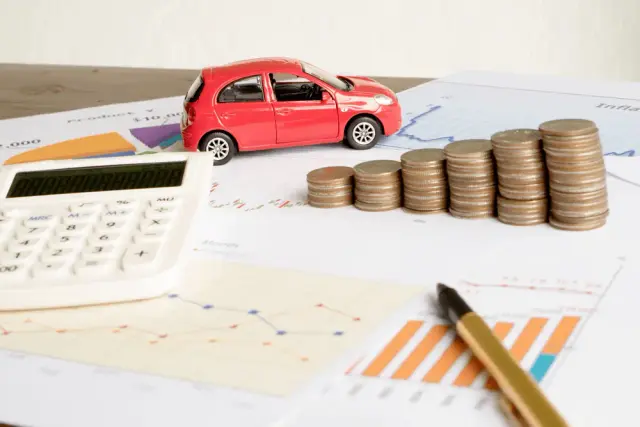Private vehicle sales need a safe, legal title transfer process. This title transfer guide gives you everything you need to know to sign over a car title in PA.
To understand more about the certificate of title and why it matters so much, check out our complete car title guide. It covers every angle of this important topic.

What is the Michigan title transfer process?
Transferring a Pennsylvania Car Title
You’ll also need specific documentation.
Pennsylvania documentation requirements are similar to most other states, but each state can have slightly different requirements. Pennsylvania is no exception. You may be familiar with much of the process if you’ve sold or purchased a vehicle in another state, but it’s important to review these Pennsylvania-specific requirements.
What Documents Are Needed to Transfer a Car Title in PA?
1. Proper identification documents for both buyer and seller—PrivateAuto verifies the identities of buyer and seller with our app.
2. Vehicle ownership documents proving that the seller is the owner of the car.
3. Certificate of title (also doubles as proof of ownership, covering #2 above)
4. Proof of insurance (insurance card)
Identity Verification
Proof of Vehicle Ownership (Seller)
- Pennsylvania certificate of title
- Out-of-state certificate of title
- Manufacturer certificate
- Statement of origin
- Certificate of salvage title, when applicable
- Court order, in specific situations
Title With Notarized Signatures
It’s a good idea to check the vehicle identification number and compare it with the VIN listed on the vehicle title. This is an important step that helps reduce the risk of fraud and lowers instances of user error.
If you buy or sell through the PrivateAuto platform, the title will already be verified for added peace of mind.

Proof of Insurance
- Insurance policy declaration page
- Insurance card
- Copy of insurance application to the Pennsylvania Assigned Risk Plan
- Insurance policy number and other required information
Buyers won’t be able to legally register their vehicle without proof of insurance. Be sure you schedule signing over the title to be sure the buyer understands this requirement and has time to get an insurance policy on the vehicle.
If you don’t have car insurance, get a quick quote here.
Can you transfer a car title online in PA?
Can You Transfer a Car Title Online in PA?
This means you’ll need to meet in-person to sign the title and have it notarized.
Who pays sales tax on a used car transaction in PA?
Who Pays the Sales Tax on a Used Car Transaction in PA?
Pennsylvania car sales tax is 6% of the purchase price (or market value) of the vehicle. Some municipalities and counties add additional local sales tax onto the state’s 6%. If you live in Allegheny County, you’ll pay 7%; Philly residents pay 8%.
In addition to paying the sales tax, the title transfer fee and other expenses are typically paid by the buyer, but be sure to make this clear during the negotiation process. Fees vary, so check the current rates as you prepare to purchase a privately owned vehicle in Pennsylvania.
Do both parties need to be present to transfer a car title in PA?
Do Both Parties Need to Be Present to Transfer a Car Title in PA?
Conceivably, the signing and notarization could be done separately, with buyer and seller consecutively appearing before the notary with the title. It’s more efficient, however, to appear together and get the transaction done.
Note that if two parties are listed as owners on the title, Pennsylvania requires both owners of the vehicle to sign the title.
How to Transfer a Title in PA
1. Buyer and seller sign the title before a Pennsylvania notary public, who notarizes the title. Make sure the sale price is listed.
2. Seller reports odometer reading on PA title.
3. Seller removes vehicle plates.
4. Buyer insures vehicle and brings proof of insurance.
5. Buyer registers vehicle and pays taxes and registration fees.
Important Title Transfer Info
- Only use black or blue ink. Any other color will void the title.
- Do not erase anything or use white-out.
- Write neatly.
- Do not use nicknames.
- Mistakes can void the document.
Front of the Title
1. If there is a lien on the title, the lienholder will need to release the lien in the first teal-colored section shown below.
2. If the buyer is getting financing, there will be a new lienholder, and the new lienholder will need to enter the required information into the second teal-colored section shown below.
3. The notary public will enter the required information and notarize the title in the section shown in red below.
Back of the Title
1. The seller enters the exact odometer reading into the rectangle shown in red, below.
2. Don’t include tenths of a mile; round up to the nearest full mile.
3. Don’t check boxes 1 or 2 unless the odometer is in excess of its mechanical limits or the mileage listed is not the actual mileage of the vehicle.
4. The buyer prints the following info into the box shown in teal below:
5. Name: last, first, and middle (if applicable).
6. Street address, city, and state.
7. The purchase price of the vehicle.
8. Signature (if there are multiple buyers, each will sign).
9. The seller prints and signs their name in the red rectangle marked “3” below.
10. If there is a new lienholder, they will enter required information into the section marked with navy, below.
Out-of-State Title Transfer
- Completed out-of-state title transfer application
- Valid out-of-state title
- Proof of identification
- Vehicle insurance
- Pay sales tax and fees
How much does it cost to transfer a car title in PA?
How Much Does it Cost to Transfer a Car Title in PA?
It is customary for the buyer to pay the fee.
Pennsylvania Clean Vehicle Program
The Pennsylvania Department of Transportation or PennDOT and the Pennsylvania Department of Environmental Protection work together to ensure vehicles in the state maintain emissions requirements for all 50 states.
There are many exceptions to this program, but you’re required to ensure the vehicle passes if it isn’t excluded from the program. Here are some vehicle types that don’t need to pass emissions tests as part of the Clean Vehicle Program in PA:
- Vehicles with over 7,500 miles
- Vehicles used exclusively for off-highway driving
- Emergency vehicles
- National security exemption vehicles
- Vehicles transferred by court decree or inheritance

How to sell a car in PA privately?
Buy and Sell Cars in Pennsylvania With PrivateAuto
Steps for Selling Your Vehicle through PrivateAuto
You’ll need your vehicle title and other documentation discussed above. Have it handy, so you’re not scrambling to find it at the moment of completing a sale.
Two: register on PrivateAuto and get verified
To make PrivateAuto a safe place for everyone, we require email, phone, and driver’s license verification, including facial recognition.
Three: list your car
Easily create your PrivateAuto listing with our step-by-step guide. Bonus: we include a window brochure with a QR code scannable to your listing.
Four: set your terms
It’s your car, so you drive the deal! You can control where, when, and who you meet. Decide whether to accept only ID-verified buyers, or buyers with verified funds. Don’t waste your time with buyers who aren’t verified to your preference.
Five: vet incoming offers
Manage offers in one place with the ability to accept, reject, or counter offers within the app. Listing on multiple sites? Filter all communications through PrivateAuto by sharing your listing link on all platforms. Your personal info is protected: no more giving out your phone number or email address. All communication happens in our app.
Six: choose a buyer
When you find an offer you like, accept it and proceed to the next step with that buyer.
Seven: schedule a test drive
The buyer will want to test drive your car. No more back and forth texts. You never have to give out your phone number. Rather, use our handy scheduling feature to coordinate a time and place for a test drive. (Oh, and you’ll be able to finalize the transaction instantly at the test drive location, FYI.)
Eight: e-sign documents
After the buyer is satisfied with your car and the two of you have agreed on a purchase price, you can easily e-sign the bill of sale within our app, from your phone. With our shared documents feature, you can easily locate the paperwork needed after the sale.
For more on why we highly recommend a bill of sale, even when it’s not required by state law, read our complete guide to the bill of sale for used car transactions.
Nine: get paid, instantly
Before PrivateAuto, receiving funds was the most stressful part of the entire selling process, especially for any used car sale over $5,000. There just aren’t a lot of good ways to move large amounts of money quickly and conveniently. Those days are over! Verify and receive funds instantaneously with PrivateAuto Pay, our innovative banking integration. Guaranteed funds for transactions large and small.
Ten: transfer title
When you sell your vehicle, fill out the necessary information on the back of the title transfer document.
Eleven: remove license plates
In Pennsylvania, the seller removes the license plates from the car in a private sale.
Different states have different rules for what to do with plates in a car sale. For more, see our complete guide to handling license plates.
Twelve: cancel car insurance
You don’t want to pay for insurance on a car you no longer own, so be sure to remove the sold vehicle from your insurance plan.
How to register a car in PA?
How to register a car in PA?
Documentation:
- Pennsylvania driver’s license or ID card
- Vehicle Sales and Use Tax Return/Application for Registration (Form MV-4ST) (not available online)
- Proof of Pennsylvania vehicle insurance
- Proof of vehicle ownership
- Proof of safety inspection
- Proof of emissions inspection (if applicable)
- Odometer disclosure statement
- Vehicle Identification Number verification
- Lienholder information (if applicable)
Payment:
- $37 registration fee
- $58 title fee ($78 with a lien recorded)
- 6% sales tax (7% in Allegheny County; 8% in Philadelphia)
- DMV transaction fee (if required)
Interested in Buying a Used Car in Pennsylvania?
PA Title Transfer FAQ
How do I get a title replacement in PA?
To replace a lost or damaged Pennsylvania title for your vehicle, complete the “Application for Duplicate Certificate of Title By Owner” and mail it to the following address with $58 for title fees enclosed (check or money order).
PA Department of Transportation
Bureau of Motor Vehicles
P.O. Box 68593
Harrisburg, PA 17106-8593
After mailing in the application for certificate form, PennDOT will issue a title replacement.
Should I remove my license plates when I sell a used car in PA?
Yes, the seller removes the car’s license plates. You can either use them on another vehicle you own, or turn them in to PennDOT.
What is the safest method of payment when selling a PA vehicle?
The safest way to receive payment when selling a car used to be cash. With PrivateAuto Pay, you can avoid the risks and hassle of dealing with large sums of cash and get paid instantaneously through our app with our integrated banking partner.
By receiving your money through our integrated banking system, both buyers and sellers can stay safe while exchanging large sums of money, as they don’t have to share their contact or banking information during the car buying process.
PrivateAuto Pay also enables remote vehicle transactions by providing escrow-like capabilities without the time, inconvenience, and expense associated with third-party escrow services.
How do I complete Form MV1?
Form MV-1 is Pennsylvania’s “Application for Certificate of Title” must be completed by an authorized PennDOT agent. This PennDOT PDF explains all about Form MV-1.
Is selling a car privately for cash a good idea?
Selling your Pennsylvania vehicle privately for cash can be a good idea, but only if you’re selling to a verified buyer. Though the chances of cash being counterfeit are low, it can still happen, and you won’t know that it did until it’s too late to do anything about it.
PrivateAuto offers the immediacy of a cash payment without the risk. Our PrivateAuto Pay feature is a full banking integration; when the buyer authorizes the funds transfer through our app, money instantly moves from their PrivateAuto account into yours—24 hours a day, 365 days a year.
How to protect yourself when selling a car privately?
To protect yourself when selling a car privately, we recommend the following practices:
1. Don’t give out your contact information
2. Verify that the buyer has the funds to purchase the vehicle
3. Deal with verified buyers only
4. Receive the payment through PrivateAuto Pay
The best way to protect yourself when selling a car privately is by selling on a secure platform that offers these features (such as PrivateAuto).
How do I handle a name change on my PA title?
If your name has changed, complete Form MV-41 and return to PennDOT.
